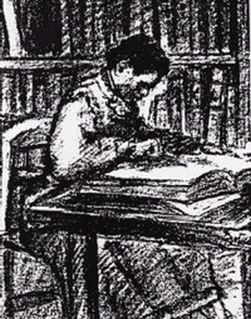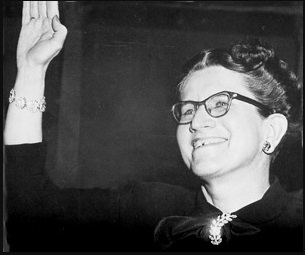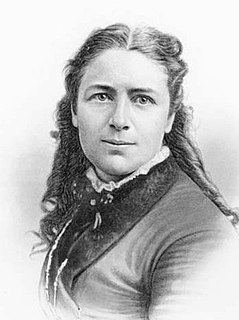Related Research Articles

Jody Williams is an American political activist known for her work in banning anti-personnel landmines, her defense of human rights, and her efforts to promote new understandings of security in today's world. She was awarded the Nobel Peace Prize in 1997 for her work toward the banning and clearing of anti-personnel mines.

Emma Hart Willard was an American women's rights activist who dedicated her life to education. She worked in several schools and founded the first school for women's higher education, the Troy Female Seminary in Troy, New York. With the success of her school, Willard was able to travel across the country and abroad, to promote education for women. The seminary was renamed the Emma Willard School in 1895 in her honor.

Castleton University is a public university in Castleton, Vermont. It has an enrollment of 2000 students and offers more than 30 undergraduate programs, as well as master's degrees in education and accounting. It is accredited by the New England Commission of Higher Education.

Florence Rena Sabin was an American medical scientist. She was a pioneer for women in science; she was the first woman to hold a full professorship at Johns Hopkins School of Medicine, the first woman elected to the National Academy of Sciences, and the first woman to head a department at the Rockefeller Institute for Medical Research. During her years of retirement, she pursued a second career as a public health activist in Colorado, and in 1951 received the Albert Lasker Public Service Award for this work.

Belva Ann Bennett Lockwood was an American attorney, politician, educator, and author. She was active in working for women's rights, including women's suffrage. Lockwood overcame many social and personal obstacles related to gender restrictions. After college, she became a teacher and principal, working to equalize pay for women in education. She supported the movement for world peace, and was a proponent of the Temperance movement.

Musa, also known as Thea Musa, was a ruling queen of the Parthian Empire from 2 BC to 4 AD. Originally an Italian slave-girl, she was given as a gift to the Parthian monarch Phraates IV by the Roman Emperor Augustus. She quickly became queen and a favourite of Phraates IV, giving birth to Phraataces. In 2 BC, she had Phraates IV poisoned and made herself, along with Phraates V, the co-rulers of the empire. Their reign was short-lived; they were forced to flee to Rome after being deposed by the Parthian nobility, who crowned Orodes III as king.

Charlotte E. Ray was an American lawyer. She was the first black American female lawyer in the United States. Ray graduated from Howard University School of Law in 1872. She was also the first female admitted to the District of Columbia Bar, and the first woman admitted to practice before the Supreme Court of the District of Columbia. Her admission was used as a precedent by women in other states who sought admission to the bar.

Consuelo Northrop Bailey was an American lawyer, politician, and elected official. She was the first woman to serve as Speaker of the Vermont House of Representatives and as Lieutenant Governor of Vermont.

Mary Jane Safford-Blake was a nurse, physician, educator, and humanitarian. As a nurse in the Union army she worked closely with Mary Ann Bickerdyke treating the sick and injured near Fort Donelson, and was nicknamed the "Cairo Angel" for her service in Cairo, Illinois. After the war she became one of the first female gynecologists in the United States and was the first woman to perform an ovariotomy. She later taught at Boston University, and was one of the first women elected to the Boston School Committee.

J. (Julia) Jessie Taft was an early American authority on child placement and therapeutic adoption. Educated at the University of Chicago, she spent the bulk of her professional life at the University of Pennsylvania, where she and Virginia Robinson were the co-founders and innovators of the functional approach to social work. Taft is the author of The Dynamics of Therapy in a Controlled Relationship (1933). She is also remembered for her work as the translator and biographer of Otto Rank, an outcast disciple of Sigmund Freud; in addition, development of the functional approach to social work was greatly inspired by her work with Rank. She and her lifelong companion, Virginia Robinson, adopted and raised two children.

Jessie Shirley Bernard was an American sociologist and noted feminist scholar. She was a persistent forerunner of feminist thought in American sociology and her life's work is characterized as extraordinarily productive spanning several intellectual and political eras. Bernard studied and wrote about women's lives since the late 1930s and her contributions to social sciences and feminist theory regarding women, sex, marriage, and the interaction with the family and community are well noted. She has garnered numerous honors in her career and has several awards named after her, such as the Jessie Bernard Award. Jessie Bernard was a prolific writer, having published 15 sole-authored books, 9 co-authored books, over 75 journal articles, and over 40 book chapters. The final chapter of her book American Community Behavior is heavily based on Raphael Lemkin's work and is considered one of the earliest sociological studies of genocide.

Jessie Diggins is an American cross-country skier. She and teammate Kikkan Randall won the United States' first ever cross-country skiing gold medal at the Winter Olympics in women's team sprint at Pyeongchang in 2018. In 2021, she clinched the top spot in the overall women's standings for the 2020–21 FIS Cross-Country World Cup. Diggens wrote an autobiography, Brave Enough, about her athletic accomplishments and personal struggles with bulimia nervosa as a teenager.

Laura de Force Gordon was a California lawyer, newspaper publisher, and a prominent suffragette. She was the first woman to run a daily newspaper in the United States, and the second female lawyer admitted to practice in California.

Lydia White Shattuck was an American botanist, naturalist, chemist, and professor at Mount Holyoke Female Seminary.

Caroline Burnham Kilgore was the first woman admitted to the bar in the Commonwealth of Pennsylvania.
Vaino Hassan Spencer was an American judge, the first African-American woman appointed to a judgeship in California. She co-founded the Black Women Lawyers Association in 1975, and the National Association of Women Judges in 1979.
Lena Giudici was an American lawyer and clubwoman. Giudici was the third woman admitted to the Vermont Bar Association (1921) and a member of the Massachusetts Bar Association (1920). She was active in civic and community affairs, serving on the board of the Office of Price Administration and presiding over the Vermont Federation of Professional and Business Women's Clubs.
Emma Fall Schofield was, along with Sadie Lipner Shulman, the first female judge in Massachusetts.
References
- ↑ Weatherford, Doris (2012-01-20). Women in American Politics: History and Milestones. SAGE. ISBN 9781608710072.
- ↑ Kunin, Madeleine M. (2012-03-22). "Vermont Women in History". HuffPost. Retrieved 2019-08-24.
- ↑ by, Kimberly Lamay Licursi and Celine Racine Paquette, Foreword (2018-04-16). Franco-Americans in the Champlain Valley. Arcadia Publishing. ISBN 9781467127868.
- ↑ Duffy, John J.; Hand, Samuel B.; Orth, Ralph H. (2003). The Vermont Encyclopedia. UPNE. ISBN 9781584650867.
- ↑ "Jessie Lafountain Bigwood (1874-1953) Papers, 1886-1988 MSA 391" (PDF). Vermont Historical Society.
- ↑ The New England Business Directory and Gazetteer for ... Sampson & Murdock Company. 1908.